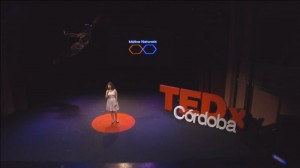Dear Mirror Networkers,
I first discovered Argentina last June when I got invited to speak at the Youth Innovation Festival in Buenos Aires. I used to say that if and when I visited Latin America I would most certainly stay there. Well, I can now confirm that Argentina has this effect on people. It is not only the fantastic meat, the tango, the immensity; it is something more, deeply rooted in the Argentinian culture that makes you want to be a part of it.
Argentinians always put a « re » in front of their adjectives to emphasize them. Emphasis suits the country very well; nothing there is mediocre. Argentina was the leader of Latin America for decades thanks to its agriculture and dynamic exportations. At that time, they implemented a large public educational system – from primary school to university – that has done a great job until the past twenty years. The state of education in Argentina appears to be very correlated with its economy. It flourished and then started to fail ending up in an important crisis.
Today, Argentina has to face many challenges. First of all, teachers are poorly and randomly trained in many centers all over the country created to provide a professional future to citizens in rural areas, as they were cheaper to develop than any other type of academic institutions. In Argentina, almost anybody can become a teacher; you just need to apply and then to add up points – if you have a degree for example –. Following these simple steps and without any evaluation, you will most likely get a position somewhere where teachers are lacking. Of course there are some specific educational sciences university tracks but generally, almost no teacher knows about pedagogy. In some areas, not only will they accept anybody as a teacher but they will even ask some of them to serve more then 10 schools at a time, they are called “taxi-teachers”.
Secondly, it is important to pay attention to the quality of the school administration. Indeed, only teachers can become principals and take administrative charges after years of practice and by adding more points. Nevertheless, despite their merit, they will never receive any kind of training on how to manage a school from its finances to its human resources. Many schools therefore end up failing their communities because of poor management.
The Argentinian educational system did not become decadent only because of the schools; it takes more than that. The other main issue resides in the lack of motivation and trust from the people. Very few Argentinian families still value education as a great way to move forward in life and in society. The number of adults without their graduation diploma is unbelievable and usually the rule is not to finish school. If and when they do, they hardly ever chose engineering careers and alike demanding paths, which is deplored massively by corporate, academic and public leaders. At the same time, Argentina both welcomes many under-qualified workers and loses well-trained brains fleeing abroad. This process results in an under-developed and empowered workforce damaging the country’s chances of success and innovation.
Finally, politicians have a clear view on all these issues but yet not all of them seem concerned by the situation. Corruption is important and populists discourses too.
The situation appears to be stuck, and yet, Argentina is always and will always be full of surprises and well-deserved pride.
Despite the visible decline and increasing poverty rates, one can feel the exciting new beginning carried by some very innovative and talented individuals and organizations busy waking up their country. Entrepreneurship in Argentina today is the new grail. Many start ups, incubators, investors, public programs, are pushing forward new ways to learn and work. This dynamic ecosystem tackles Argentinian educational issues one by one: Acamica and Wizzboo are two digital platforms facilitating e-learning around entrepreneurial skills; Kuepa is also a website that builds on the “bachilleratos populares” these courses opened for everyone in ancient factories where all teachers are volunteers and help people graduate from high school; new types of incubators like Incutex also help building the future of education by investing and accompanying closely some of the most promising young enterprises dealing with education such as Netbel which provides efficient management tools to schools; the public sector also can contribute to this awakening efforts as the “BA Emprende” program from the Buenos Aires city government – they designed very specific curriculum for citizens, teachers, students, and communities to embrace entrepreneurship and they wish to empower them to take ownership of their own lives; finally the private sector participates in this exciting process by joining forces in foundations and philanthropic initiatives such as the very dynamic and accurate “Fundacion Cordoba Mejora” which develops a leadership program for school directors with the help of many CEOs and head of businesses from the region.
Argentina is dealing with its issues as a society and it is impressive to see how everyone is taking his or her role seriously. Some want to awake, some want to give away tools, others wish to provide jobs, and all want to move the situation forward building this exciting community of knowledge. Entrepreneurship is not only a campaign theme; it is the core of Argentina’s fierce spirit.
Running in a park of Buenos Aires and thinking about my own enterprise and the Mirror Network trip I realized that I did it, I toured the world. I always thought it would all start in France and end there when in fact the journey started and ended in Argentina. That’s the thing with life adventures; you hardly ever know where they start and where they are going to take you. I have been lucky enough to be invited to share my story at the TEDx Cordoba conference and it has been a pleasure to end the voyage in such agreeable and cheering company.
If you are interested and can speak a little Spanish please check out the video of the event: https://www.youtube.com/watch?v=BcZgnvZRQlg
It has been hard to summarize such a trip in a few slides but I understood that it will be very important for me to share the lessons I learned and the conclusions I made only for others to feel capable of starting their own journey. I have been writing a lot about the importance of questions in my previous letters and I maintain that interrogations are the starting point of anything and everything. Argentina is a vivid example: only with questioning the established system can they revamp the country’s educational system. Questions lead to entrepreneurship, and that concerns us all.
Until the next and final letter,
Enjoy the ride and think about your next beginning!
Léa

















Commentaires récents